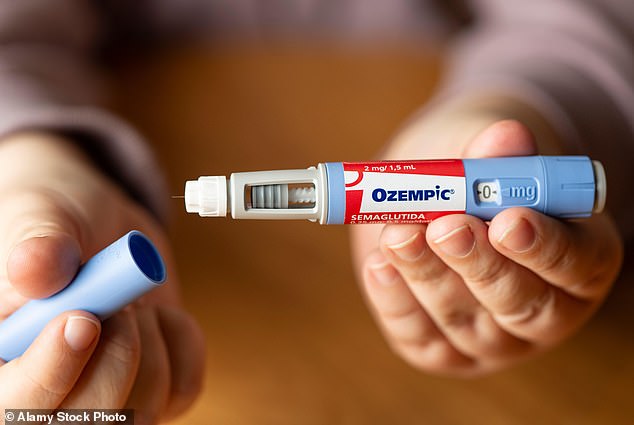I am 68 years old, overweight and my blood pressure is alarmingly high. Since the menopause, I feel constantly exhausted. I have read a lot about the benefits of Ozempic and I am wondering if it could work for me. Should I ask my GP for a prescription?
Ozempic, or semaglutide, is a diabetes drug that causes weight loss. This is because the injection suppresses appetite, meaning patients eat less.
The manufacturer has begun selling it specifically as an anti-obesity drug, under the brand name Wegovy. This year, the NHS announced it would offer Wegovy to some obese patients.
In theory, patients can get an NHS prescription if their BMI is over 35 and they have a weight-related condition such as diabetes or high blood pressure.
But supplies of the drug are limited, largely due to huge global demand, so few patients have been able to get their hands on it.
Additionally, it must be prescribed by a weight management specialist, not a GP, meaning patients must also wait for a referral, which can take some time.
Ozempic – or semaglutide – is a diabetes drug that causes weight loss by suppressing appetite, meaning patients eat less.
This is frustrating as many Britons could benefit from semaglutide but, due to the vanity of wealthy people wanting to slim down a bit, those less fortunate financially are forced to wait.
It’s important to note that semaglutide is not a miracle drug, despite claims. People typically lose about 20 percent of their weight, which is significant in terms of health, but may not make a huge cosmetic change.
NHS patients prescribed this medicine should continue to eat healthily and exercise regularly.
Unpleasant side effects include nausea and vomiting, which usually go away within a few weeks or months, but some people find them too debilitating to continue the injections.
However, fighting obesity is vital and it is true that, for many, semaglutide represents a radical change.
Anyone who thinks they might benefit should speak to their GP, who can explain the options and, if appropriate, refer them to a weight management specialist who can prescribe the medication.
I recently had a brain scan which revealed white spots. I asked my GP what that meant and he said it was “just wear and tear”. I am still worried. Should I make lifestyle changes to stop it from getting worse? I am 68 years old.
The term wasting is not very helpful. White spots usually indicate what we call white matter lesions. These abnormalities have always been considered a sign of aging of the brain’s blood vessels.
This is similar to clogged arteries and heart disease.

White spots on brain scans often indicate lesions in the white matter, which have long been considered a sign of aging blood vessels.
Blood vessels in the brain can similarly atrophy, and this is considered a risk factor for stroke, mini-stroke, and vascular dementia.
It would not be unusual to see this change in a person with high blood pressure, for example, and it may not produce symptoms. As people age, the number of these spots increases.
Some experts consider white spots to be a normal part of aging (wear and tear, in fact), but if there are a lot of them, they shouldn’t be considered benign. If they’ve been seen on a brain scan but have been downplayed, I’m assuming there aren’t many and the spots aren’t a big deal. But it’s still worth going back and checking.
Maintaining a normal weight, exercising, and avoiding smoking and drinking alcohol are important to help reduce and prevent white spots.
Underlying conditions such as high blood pressure, diabetes and high cholesterol should be strictly treated to prevent further damage to blood vessels.
When I eat, I get a runny nose and sneeze for five minutes. It’s humiliating. What’s going on?
It could be oral allergy syndrome, also known as pollen food syndrome. This occurs in people with hay fever when the body mistakenly recognises certain fruits and vegetables, especially when eaten raw, as pollen due to their similar chemical structure.
The most common trigger foods are apples, peaches, kiwi, hazelnuts and almonds, but almost any fruit, vegetable or nut can cause a reaction. People can even react to herbs.
It can be very difficult to identify triggers, but keeping a food diary can help. This can rule out factors that are not relevant.
It may be worth trying an over-the-counter antihistamine tablet to see if it resolves the problem. If so, most people are safe to take the tablets regularly to calm an allergy.
Runny nose and sneezing after eating can also be something called non-allergic rhinitis, where your nose usually runs after eating hot or spicy foods.
We believe this is due to an abnormal nervous reflex and, unlike food pollen syndrome, is not an allergy.
If antihistamines don’t help, this may be the problem. You should see an ENT doctor who can consider using special nasal sprays to reduce symptoms.


